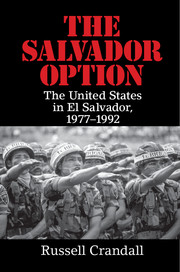Book contents
- Frontmatter
- Dedication
- Epigraph
- Contents
- List of Figures
- List of Organizations
- Acknowledgments
- 1 Introduction
- PART ONE EL SALVADOR IN THE COLD WAR
- PART TWO JIMMY CARTER
- PART THREE RONALD REAGAN
- 19 Reagan Arrives
- 20 Reagan and Salvador
- 21 El Mozote
- 22 Another Vietnam
- 23 Solidarity
- 24 Troop Cap and Certifying Human Rights
- 25 Reagan Gambles on Elections, 1982
- 26 The Shultz Doctrine
- 27 Human Rights
- 28 Henry Kissinger
- 29 Contras
- 30 “Elections Yes, Dialogue No,” 1984 Presidential Election
- 31 La Palma
- 32 Esquipulas
- 33 Counterinsurgency I
- 34 Counterinsurgency II
- 35 Zona Rosa
- 36 Air War
- 37 José Napoleón Duarte
- 38 Iran-Contra
- PART FOUR GEORGE H. W. BUSH
- PART FIVE POSTWAR
- Notes
- Bibliography
- Index
30 - “Elections Yes, Dialogue No,” 1984 Presidential Election
from PART THREE - RONALD REAGAN
Published online by Cambridge University Press: 05 June 2016
- Frontmatter
- Dedication
- Epigraph
- Contents
- List of Figures
- List of Organizations
- Acknowledgments
- 1 Introduction
- PART ONE EL SALVADOR IN THE COLD WAR
- PART TWO JIMMY CARTER
- PART THREE RONALD REAGAN
- 19 Reagan Arrives
- 20 Reagan and Salvador
- 21 El Mozote
- 22 Another Vietnam
- 23 Solidarity
- 24 Troop Cap and Certifying Human Rights
- 25 Reagan Gambles on Elections, 1982
- 26 The Shultz Doctrine
- 27 Human Rights
- 28 Henry Kissinger
- 29 Contras
- 30 “Elections Yes, Dialogue No,” 1984 Presidential Election
- 31 La Palma
- 32 Esquipulas
- 33 Counterinsurgency I
- 34 Counterinsurgency II
- 35 Zona Rosa
- 36 Air War
- 37 José Napoleón Duarte
- 38 Iran-Contra
- PART FOUR GEORGE H. W. BUSH
- PART FIVE POSTWAR
- Notes
- Bibliography
- Index
Summary
The strong message of this [1984] election is that the Salvadoran people have declared their own political solution to the crisis that challenges the country. Three successful elections in two years are a clear repudiation of the insurgency.
– U.S. election delegationThese [U.S. aid to the election] efforts are being made for our [American] benefit and not in the interests of Salvadoran democracy. They should be seen for what they are: the props, script, and stage lighting for a shoddy farce.
– Author Frank Brodhead, 1984If the government and the imperialist power decide to hold the election in the midst of a war, that is their problem. If the war interrupts or molests the election, we are not going to stop it to protect this imperialist project.
– Joaquín Villalobos, FMLN military commander, 1984Over the first half of 1984 El Salvador once again braced for national elections, this time a historic presidential race under the new constitution promulgated a year earlier. The two main candidates were strangers to no one, the Christian Democrats’ José Napoleón Duarte and ARENA's Roberto D'Aubuisson. For the Reagan administration, the presidential elections were a critical marker in demonstrating El Salvador's progress as a democracy. On the heels of the stunning vote in 1982, there was much greater confidence that the 1984 vote would be successful. Yet, as in 1982, U.S. officials were deeply concerned that ARENA might win again – and this time “winning” meant D'Aubuisson taking the presidency – an unacceptable outcome for engagement.
U.S. diplomats also missed no opportunity to remind Salvadorans that the United States would only work with Duarte's party. As one official revealed, “Everyone in the [U.S.] Embassy knew that if Duarte didn't win that was the end of Reagan's policy in El Salvador. But everyone also knew we couldn't say that to the Salvadorans.” Despite this poorly kept secret about U.S. intentions, Secretary of State George Shultz told an audience that the United States would “maintain a neutral position regarding the results of the elections.”
Duarte's centrist candidacy was complicated from the onset given that the country's military brass was deeply skeptical of his commitment to adequately maintain the counterinsurgency effort.
- Type
- Chapter
- Information
- The Salvador OptionThe United States in El Salvador, 1977–1992, pp. 317 - 330Publisher: Cambridge University PressPrint publication year: 2016



